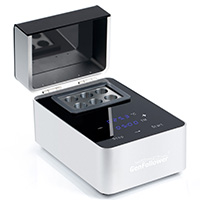Dry Bath Incubators
With over 30 years experience, Genfollower provides excellent dry baths to our international customers.
The digital dry bath heaters are outstanding products with broad temperature range and accurate control. The digital panel of our products is easy and quick to operate with no complicated setting of up, down, left, and right buttons, which gives life science researchers the convenience and the efficiency they need when working with precious samples.
Benefits of Genfollower Dry Bath Incubators:
- The full screen is available for touch and shows the temperature and time.
- Acoustic signal at the setting temperature and the end of the test.
- Safe and secure: overheating protection; over-temperature power-off.
- Microprocessor control and accurate temperature control
- Built-in temperature calibration.
Dual Block Dry Bath Incubator
Dual block dry bath incubators are controlled by micro-compute with broad temperature range and accurate control. The instruments also have a patent in preventing scald. When the block temperature reaches to 150°C, the temperature of the panel and the body are below 50°C. Three steps of programs are preset and these can be changed and combined flexibly, which greatly meet various experimental meets.
Documents:
Mini Dry Bath Incubator
Considering the different using conditions, GenFollower provides a compact and lightweight alternative of dry bath, Mini Dry Bath Incubators.
This instrument is a hand-held thermostatic dry bath incubator with advanced microprocessor control, featured as its most advantage, super fast heating up. It only takes about 5-6 minutes to rise from room temperature to 100℃. Small size and light weight enable the instrument especially suitable for crowded experimental bench.
Documents:
Even more info about Dry Bath Incubators:
What Are Dry Bath Incubators Used For?
Controlled by micro-compute, the digital dry bath incubators are widely used in sample preparation and reaction, DNA amplification, enzyme preservation, Enzyme-substrate reactions, electrophoresis gel degeneration, serum coagulation.
-200x200-2.jpg)

